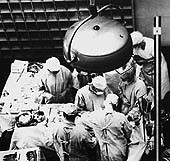Researchers Find Link Between Organ Transplants, Cancer
Immune-suppressing drugs may trigger protein that boosts tumor growth, study finds.
|
E-mail this article
Subscribe to news
Printer friendly version
|

(SOURCE: American Association for Cancer Research, news release, July 15, 2008)
WEDNESDAY, July 16 (HealthDay News) -- Anti-rejection drugs given after organ transplants may be the reason why 15 percent to 20 percent of individuals who receive such transplants have a higher risk of developing cancer within the next decade.
The good news is that targeted therapies could diminish the risk, said Harvard researchers reporting in the July 15 issue of Cancer Research.
The tumors themselves may have already existed before the transplant procedure or they may be a return of an old cancer. An immune system dampened by immunosuppressive drugs could make it easier for both scenarios to take place. On the other hand, a virus introduced from the donor organ may have precipitated the cancer, the researchers said.
And heightened production of vascular endothelial growth factor (VEGF) after the transplant may also be a factor. While this protein facilitates essential blood flow to the new organ, it can also promote the formation of new blood vessels which feed tumor growth, according to the researchers.
"It may be that anti-VEGF agents given judiciously after transplantation can reduce future cancer occurrence," said study senior author Soumitro Pal, assistant professor at Harvard Medical School's Transplantation Research Center at Children's Hospital in Boston, in a news release from the American Association for Cancer Research. "... Once the organ has stabilized, it may be possible to lower the level of VEGF expression to prevent tumor growth. We would need to figure out how to balance benefit and risk to keep cancer at bay."
Pal and his colleagues implanted human kidney cancer cells into mice, then gave the rodents cyclosporine, an immunosuppressant drug often used after transplants. Mice that received the drug grew tumors at a faster rate than mice left untreated.
But the researchers also found a potential solution to the problem: Giving targeted anti-VEGF therapy reduced the pace of growth.
Cyclosporine seems to promote the growth of cancer by activating different forms of protein kinase C, which, in turn, stimulates VEGF production, the researchers said.
More information
For more on organ and tissue donation, visit organdonor.gov.
Copyright © 2008 ScoutNews, LLC. All rights reserved. 
HealthDayNews articles are derived from various sources and do not reflect federal policy. healthfinder.gov does not endorse opinions, products, or services that may appear in news stories. For more information on health topics in the news, visit the healthfinder.gov health library.